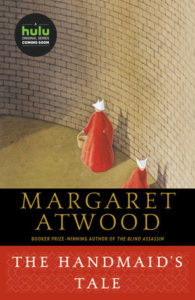 My book reviews generally do not contain spoilers even if the book has been published forever. I hate reading spoilers before I pick up a book. If I feel it necessary to spoil, I’ll let you know in advance.
My book reviews generally do not contain spoilers even if the book has been published forever. I hate reading spoilers before I pick up a book. If I feel it necessary to spoil, I’ll let you know in advance.
For Mother’s Day, my husband bought me Margaret Atwood’s The Handmaid’s Tale. Little did he know how appropriate that gift was for such an occasion. It took me a bit of time to open the first page, since I was preparing for WhedonCon, but once I did, I could NOT put the book down. Well, except to, you know, parent. And eat. Sleeping fell a bit by the wayside.
I loved this book. But really, that’s no surprise. I love basically all dystopian books. I cannot think of one I haven’t enjoyed. I absolutely hated the end of 1984, but I still loved the book. This was very similar. I didn’t care for the end, but at the same time, couldn’t see the novel end in any other way.
I think the thing I love the most about dystopian fiction is the way in which life is so very different from mine, but also so much the same. I enjoy the fear of feeling that the dystopian future might actually come to pass. The author needs to walk a tightrope of basing the story in reality and moving into the future with just enough believability for the reader to consider it an actual possibility. That’s where horror and fascination draw the reader in. Dystopian works also shrewdly comment on the current political climate and social trends – if this is what we focus on, what is the logical next step? How can we take what is happening now to the absolute extreme?
Atwood’s book, which deals with a totalitarian government working ‘in the best interests’ of the people, focuses on a single woman, her task of producing a child, and the events that led up to that point. The story is told in stream of consciousness and jumps back and forth between present and various past events. It takes a bit of time to get into the flow of the writing, since Atwood jumps right in, but once you’re in the groove, the words flow and it’s like listening to a compelling story being told to you. The jumps in time make sense.
This book, centered on the roles of women in the past, present, and future, touches a bit too close to home on several fronts. You know an author is successful when you find yourself vacillating between the viewpoints of the true believers and the rebellion. Atwood, a skillful writer, shows us the logic of the people as they ease into a frightening future, confused about how they got there, but complicit in each step. It’s an eye-opening story that makes us consider what freedom really is, and how to avoid a future as abysmal as the one the Handmaid describes.
You’ll enjoy this book if you enjoy: fiction about women and women’s rights, dystopian stories, 1984, Fahrenheit 451, or Shades of Grey.
P.S. I have yet to see the Hulu series, but I’m looking forward to it, and will be posting a review of that as well.
